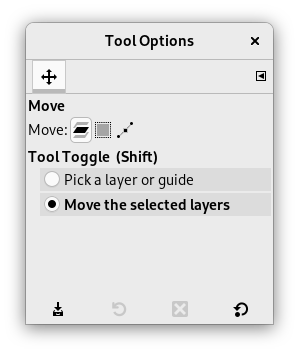Værktøjet Flytning bruges til at flytte lag, markeringer, kurver eller hjælpelinjer. Det virker også på tekster.
Der er forskellige måder at aktivere værktøjet på:
-
I hovedmenuen: → → .
-
Ved at klikke på værktøjsikonet
i Værktøjskassen.
-
Ved at bruge tastaturgenvejen M.
-
Værktøjet flytning aktiveres automatisk, når du opretter en hjælpelinje.
Normalt vises værktøjsindstillingerne i et vindue under Værktøjskassen, så snart du aktiverer et værktøj. Hvis de ikke gør, kan du få adgang til dem fra hovedmenuen via → → , som åbner indstillingsvinduet for det valgte værktøj. Man kan også få adgang til de tilgængelige værktøjsindstillinger ved at dobbeltklikke på det tilsvarende værktøjsikon i Værktøjskassen.
- Flytning
-
![[Bemærk]](images/note.png)
Bemærk Disse indstillinger beskrevet i Fællesindstillinger for transformeringsværktøjer.
Husk, at de indstillinger, du vælger, varer ved, også efter du har afsluttet værktøjet.
- Værktøjstilstand (Skift)
-
Hvis et “Lag” skal flyttes
- Vælg et lag eller en hjælpelinje
-
I et billede med flere lag bliver musemarkøren til et trådkors, når den flyttes hen over et element, der hører til det aktuelle lag. Så kan du klikke og trække i det. Hvis musemarkøren har form som en lille hånd (hvilket viser, at du ikke vælger et element i det aktive lag), flytter du i stedet et ikkeaktivt lag (det bliver det aktive lag, mens du flytter).
Hvis der findes en hjælpelinje i billedet, bliver den rød, når musemarkøren føres hen over den. Så er den aktiveret, og du kan flytte den.
I skæringspunktet mellem to hjælpelinjer kan du klikke og trække for at flytte dem sammen. Dette er nyttigt, når hjælpelinjerne bruges til at markere et punkt snarere end et par linjer (f.eks. som det er tilfældet med mandala-symmetrihjælpelinjerne, der markerer symmetriens oprindelsespunkt).
- Flyt de markerede lag
-
Kun de markerede lag vil blive flyttet (hvis de er mindre end lærredet). Dette kan være nyttigt, hvis du vil flytte lag med gennemsigtige områder, hvor du nemt kan vælge det forkerte lag gennem disse gennemsigtige områder.
![[Bemærk]](images/note.png)
Bemærk Du kan også flytte de markerede lag ved at indstille forskydningen i dialogen Redigér lagets egenskaber.
Hvis en “Markering” skal flyttes
Markeringens omrids vil blive flyttet (se Afsnit 2.1, “Flyt og ændr størrelsen på en markering”).
Hvis en “Kurve” skal flyttes
- Vælg en kurve
-
Dette er standardindstillingen. Musemarkøren bliver til en lille hånd, når den føres hen over en synlig kurve. Så kan du flytte denne kurve ved at klikke og trække den (den vil være den aktive kurve, mens du flytter).
- Flyt den aktive kurve
-
Kun den aktuelle kurve vil blive flyttet. Du kan ændre den aktuelle kurve i dialogen Kurver.
- Flytning af en markering
-
Værktøjet Flytning gør det kun muligt at flytte omridset af markeringen. Hvis Flyt-tilstanden er “Lag”, skal du holde Ctrl+Alt-tasterne nede.
Hvis Flyt-tilstanden er “Markering”, kan du klikke og trække i et vilkårligt punkt på lærredet for at flytte omridset af markeringen. Du kan også bruge piletasterne til at flytte markeringer præcist. Hvis du derefter holder Skift-tasten nede, flyttes det i intervaller på 25 pixels.
Når du flytter en markering med værktøjet Flytning, markeres midten af markeringen med et lille kryds. Dette kryds og markeringsgrænserne retter ind efter hjælpelinjer eller gitter, hvis indstillingen → er markeret: Det gør det nemmere at justere markeringer.
Se Flyt markeringer for andre muligheder.
- Flytning af et lag
-
Flyt-tilstanden skal være “Lag”. Derefter kan du vælge mellem Flyt de markerede lag og, hvis du har et eller flere lag, Vælg et lag eller en hjælpelinje.
- Flytning af grupperede lag
-
Hvis lagene er grupperet, vil de alle flytte sig, uanset hvilket lag der i øjeblikket er aktivt.
- Flytning af en hjælpelinje
-
Når du trækker en hjælpelinje fra en lineal, aktiveres værktøjet Flytning automatisk. Det er ikke tilfældet, når du bruger et andet værktøj, og du skal selv aktivere det. Når musemarkøren føres hen over en hjælpelinje, bliver den rød, og du kan klikke og trække for at flytte den.
- Flytning af en kurve
-
Dialogen til kurveværktøjet har sin egen flyttefunktion (se Afsnit 5.2, “Kurver”). Men du kan også bruge værktøjet Flytning. Flyttetilstanden skal være sat til “Kurve”. Bemærk, at kurven bliver usynlig; gør den synlig i dialogen Kurver. Du kan vælge den kurve, der skal flyttes, eller flytte den aktive kurve.
- Flytning af tekst
-
Hver tekst har sit eget lag og kan flyttes som lag. Se Afsnit 5.3, “Tekst”.




